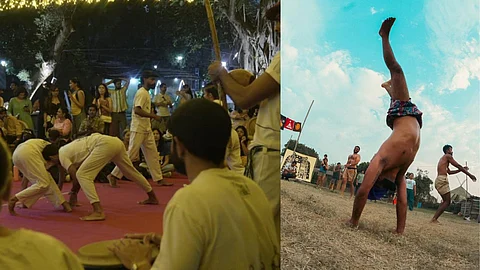
- HOMEGROWN WORLD
- #HGCREATORS
- #HGEXPLORE
- #HGVOICES
- #HGSHOP
- CAREERS
- ABOUT US
- CONTACT US

Between dance and combat, between music and defiance, there is capoeira— a Brazilian fighting art that does not punch in straight lines but swings in spirals, leaps, dodges, and singing. It is not about fighting — it's about people, heritage, and identity; a bodily conversation where you speak through kicks and sweeps while your heart maintains rhythm with music.
Capoeira was born of resistance — designed by enslaved Africans in Brazil who disguised up self-defence as dance to maintain their autonomy under colonial domination. Now, it's a vibrant integration of music, movement, ritual, and history. Practised to the rhythm of traditional instruments such as the berimbau and atabaque and led by call-and-response songs sung in Portuguese, capoeira is a living, breathing art.
“The roda, the circle we play in, is more than just a physical space,” says Shiva, founder of Casa de Capoeira in Delhi. “It holds axé, a spiritual energy passed down through Afro-Brazilian practices like candomblé, samba, and capoeira. It’s how we honour resistance, ancestry, and each other.”
But don't be tricked by the beauty — it's a fighter's game. With strong kicks (meia lua, martelo, armada), acrobatic flows (macaco, au), and strategic play (malícia), capoeira toughens the mind as well as the body. Practitioners report faster reflexes, greater mental focus, increased emotional strength, and an internal sense of rhythm and connection. There's philosophy in each dodge. Freedom in each cartwheel.
You wouldn't think it, but Delhi, India's capital of chaos and culture, is quietly emerging as a node in the worldwide web of capoeira. Here, in gritty studios, seedy parks, and city festivals, a tiny community of practitioners comes together, kicks, and sings. They're not simply learning a fighting art — they're becoming part of a lineage.
This grassroots movement is sustained by dedicated teachers such as Shiva, who are modifying the customs of capoeira to suit Indian sensibilities. Their classes unite dancers, sportsmen, musicians, and the plain curious. In any given class, you could hear the metallic ring of a pandeiro followed by invocations of "paranauê", meshing with the drone of Delhi traffic outside.
“Capoeira found its foundation in Delhi about a decade ago,” Shiva explains. “We’ve built a space where joy, discipline, and expression come together. From toddlers to adults, our classes create a feeling of belonging—especially for those who often feel like they don’t fit in.”
Shiva
An exercise in community-building, in deep listening, in learning when to push and when to back off. And maybe that's why it's so resonant here in India, where rhythm and resilience have long gone hand-in-hand.
“The jogo, the capoeira game, is a dialogue — not a fight,” Shiva shares. “It teaches patience, emotional regulation, and connection. Even aggressive energy is redirected into something creative, musical, and playful.”
Shiva
As the group expands, the subculture evolves. Capoeira circles, or rodas, are popping up at independent festivals, dance retreats, and even high schools. Began as something borrowed, but slowly it is making itself something unto its own—Indian bodies responding to Afro-Brazilian music, advancing each culture.
Casa de Capoeira has brought capoeira to schools like The British School and The Shri Ram School in Delhi, where it’s now part of the curriculum. “We’re not just teaching kicks,” Shiva says. “We’re teaching rhythm, language, and a way to process emotions—especially for kids with ADHD or special needs.”
Shiva
Capoeira in India isn't mainstream. It doesn't care to be. It's little, sweaty, deliberate, and spirit-filled. It's a quiet revolution that requires you to turn up, listen, move, and most of all — play.
“We’re building something beyond fitness,” Shiva reflects. “Capoeira is about finding your place, in movement, in music, in community. A roda is where we play, heal, and remember.”
Shiva
